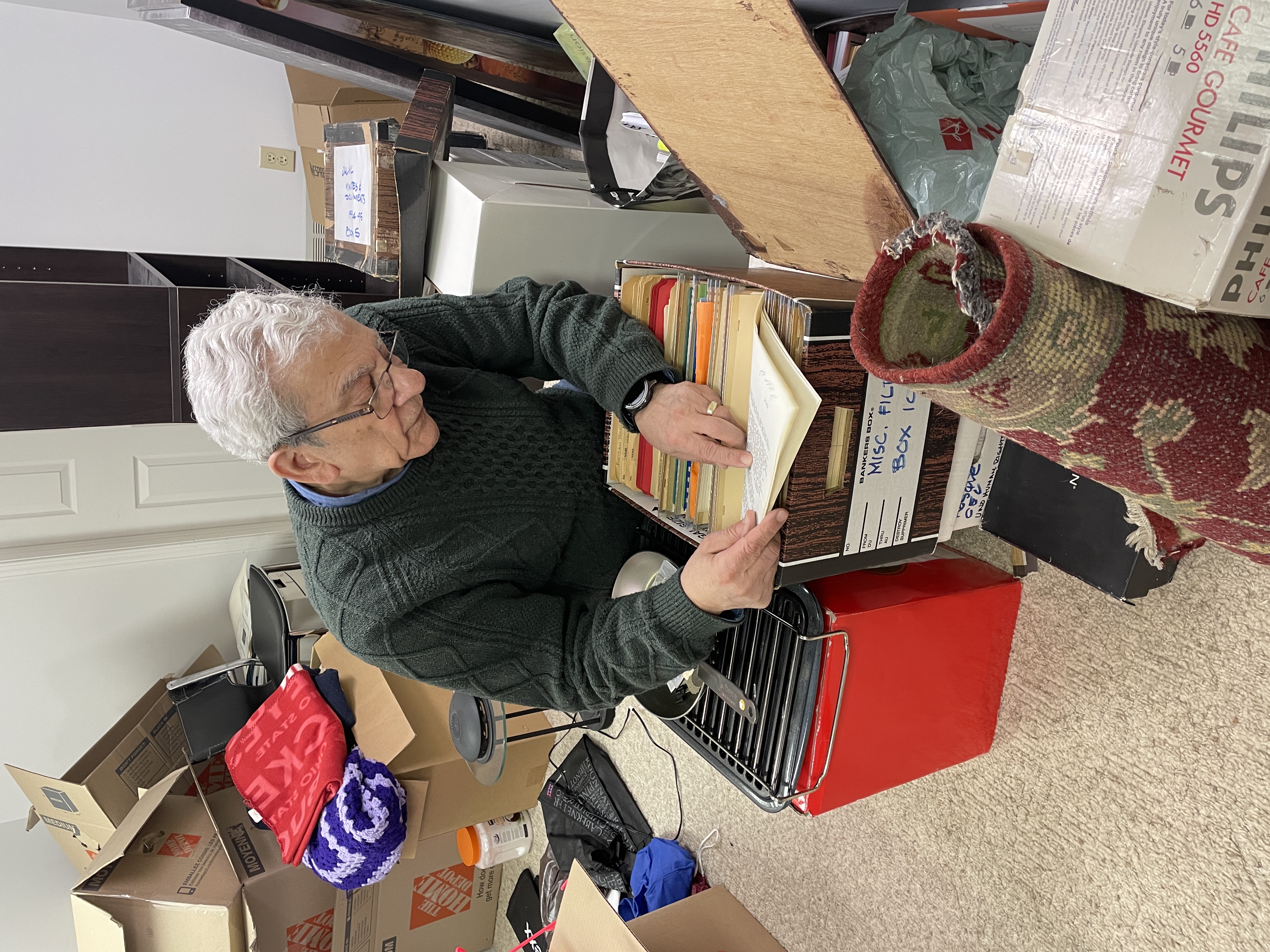
From the Archives: Contemporary Islamic Art in Ontario
October 20, 2024
The Muslims in Canada Archives (MiCA) is pleased to have loaned materials from our collection towards In Search of a Loss of Self: The Language of Alterity, an exhibition curated by Soheila Esfahani and Mélika Hashemi at the McIntosh Gallery in London, ON. The exhibition extends on Esfahani and Hashemi’s survey of the McIntosh Gallery Permanent Collection, where they noted a lack of Muslim or Islamic stories in collected works and under database search keywords. The loaned items from MiCA are a part of a process wherein the curators carve space to confront this erasure. 
In the archives: barriers to accessing our records and our stories
Esfahani and Hashemi’s experiences with stories that fall in the cracks of acquisition practices are not unique but rather indicative of the institutional barriers many face in the archives. Dominant archival practices continue to reflect early 20th century principles of record-keeping that originated from Western European and North American governments and institutions. Within these types of archives, tools such as finding aids (descriptive guides containing information about records in archival custody) are central to searching, exploring, and accessing materials. In her environmental scan of the archives of Muslims in Canada, archivist Moska Rokay noted that the search for “muslim” or “islam” in finding aids was mostly futile. The level of finding aid descriptive detail depends in part on the priority of the archive “...and even its intended audience”. Up against these systemic limitations, both implicit and explicit, Rokay invites archivists to pose an important question prior to any acquisition of archival material: “who is the audience?”
Filling the archival gaps
Muslim presence in the Americas dates back centuries. But where do we look for the Muslim stories that were erased, silenced, or never “valuable enough” to acquire? Much of Muslim history has yet to be researched on or written about – and at present, the documentary heritage of Muslims in Canada preserved barely goes back 100 years. The Muslims in Canada Archives is a participatory archive that seeks to fill this knowledge gap. In consultation with Muslim communities, our collections grow from our donors' homes, their bedrooms, their basements, their garages and anywhere else Muslim life may be found. Our descriptive practices take seriously the responsibility to resist any false claims of neutrality: “Remembering and memory are not simply individual processes but are produced socially.” A work in process, MiCA centres cultural knowledge and collaboration needed to document records in a way that reflects diverse Muslim experiences in Canada.
In Search of a Loss of Self: The Language of Alterity
Through curation, Esfahani and Hashemi also employ creative tools to contend with the disconnect experienced while tracing Muslim presence in McIntosh Gallery’s permanent collection. The exhibition includes archival materials and artistic interventions to create a ‘bricolage’ that both looks forwards and backwards. Like archivist Hazel Carby’s insistence that “No one should imagine that entering [the colonial] archive is journeying back in time to a history that is past, that is over”, Esfahani and Hashemi bring the ‘historical present’ into focus.
 Leading up to the exhibition, we sat in the small and informal MiCA reading room, sifting through materials and looking especially for the stories of Muslim artists in Southern Ontario. The files and folders that make up the collection of Hanny Hassan, a prominent Muslim-Canadian engineer and humanitarian, soon became a site of exploration and wonder. Hassan was born in London, Ontario in 1940 and was amongst the first Muslims born in Ontario.
Leading up to the exhibition, we sat in the small and informal MiCA reading room, sifting through materials and looking especially for the stories of Muslim artists in Southern Ontario. The files and folders that make up the collection of Hanny Hassan, a prominent Muslim-Canadian engineer and humanitarian, soon became a site of exploration and wonder. Hassan was born in London, Ontario in 1940 and was amongst the first Muslims born in Ontario. 
Hanny Hassan’s sister, Jamelie Hassan, is a renowned Muslim Canadian artist. In our searches, records documenting important milestones in Jamelie Hassan’s artistic career bleed and overlap with Muslim cultural events happening in London, ON. In our interactions with these records, new questions came to being: What conversations were these Muslim people in London, ON having about belonging? About exile? More specifically, what do these records tell us about the ongoing, material battle against cultural erasure? And how do we now contend with the state surveillance and hypervisibility also a part of Muslim life?
We are pleased to share some of the archival materials part of In Search of a Loss of Self: The Language of Alterity online. Visit the exhibition at McIntosh Gallery in London, ON until December 7, 2024 to learn more.

 Art-postcard by Jamelie Hassan (1991-1992), Courtesy of Hanny Hassan fonds.
Art-postcard by Jamelie Hassan (1991-1992), Courtesy of Hanny Hassan fonds.


 Excerpts from Travelling Theory pamphlet (1991), courtesy of Hanny Hassan fonds. For Esfahani and Hashemi, ‘Islamic art’ cannot be pinned down to a single geographical point, culture, people or practice. In the archives, where we see Near East Cultural Foundation of Canada programs taking place at local libraries and art supply stores, this is as clear as ever.
Excerpts from Travelling Theory pamphlet (1991), courtesy of Hanny Hassan fonds. For Esfahani and Hashemi, ‘Islamic art’ cannot be pinned down to a single geographical point, culture, people or practice. In the archives, where we see Near East Cultural Foundation of Canada programs taking place at local libraries and art supply stores, this is as clear as ever.
 Faculty of Arts at the University of Wetern Ontario event poster (1986), courtesy of Hanny Hassan fonds.
Faculty of Arts at the University of Wetern Ontario event poster (1986), courtesy of Hanny Hassan fonds.